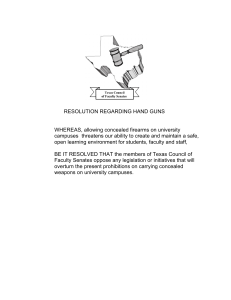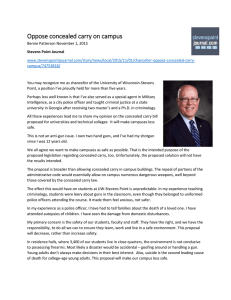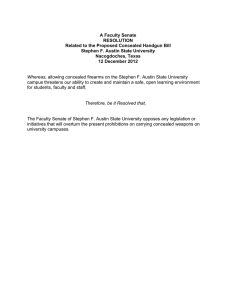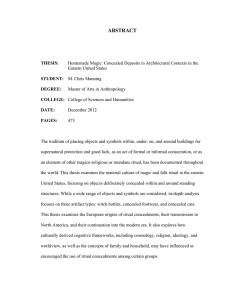1852 Van Hise Hall Tomas L. Stafford 1220 Linden Drive
advertisement
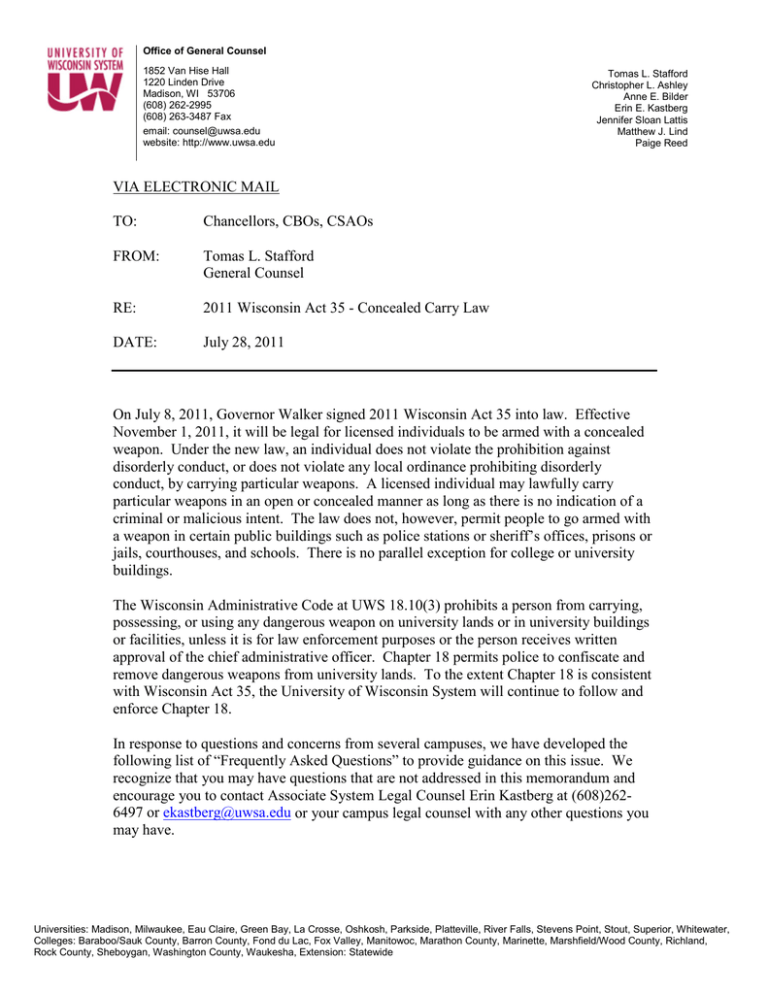
Office of General Counsel 1852 Van Hise Hall 1220 Linden Drive Madison, WI 53706 (608) 262-2995 (608) 263-3487 Fax email: counsel@uwsa.edu website: http://www.uwsa.edu Tomas L. Stafford Christopher L. Ashley Anne E. Bilder Erin E. Kastberg Jennifer Sloan Lattis Matthew J. Lind Paige Reed VIA ELECTRONIC MAIL TO: Chancellors, CBOs, CSAOs FROM: Tomas L. Stafford General Counsel RE: 2011 Wisconsin Act 35 - Concealed Carry Law DATE: July 28, 2011 On July 8, 2011, Governor Walker signed 2011 Wisconsin Act 35 into law. Effective November 1, 2011, it will be legal for licensed individuals to be armed with a concealed weapon. Under the new law, an individual does not violate the prohibition against disorderly conduct, or does not violate any local ordinance prohibiting disorderly conduct, by carrying particular weapons. A licensed individual may lawfully carry particular weapons in an open or concealed manner as long as there is no indication of a criminal or malicious intent. The law does not, however, permit people to go armed with a weapon in certain public buildings such as police stations or sheriff’s offices, prisons or jails, courthouses, and schools. There is no parallel exception for college or university buildings. The Wisconsin Administrative Code at UWS 18.10(3) prohibits a person from carrying, possessing, or using any dangerous weapon on university lands or in university buildings or facilities, unless it is for law enforcement purposes or the person receives written approval of the chief administrative officer. Chapter 18 permits police to confiscate and remove dangerous weapons from university lands. To the extent Chapter 18 is consistent with Wisconsin Act 35, the University of Wisconsin System will continue to follow and enforce Chapter 18. In response to questions and concerns from several campuses, we have developed the following list of “Frequently Asked Questions” to provide guidance on this issue. We recognize that you may have questions that are not addressed in this memorandum and encourage you to contact Associate System Legal Counsel Erin Kastberg at (608)2626497 or ekastberg@uwsa.edu or your campus legal counsel with any other questions you may have. Universities: Madison, Milwaukee, Eau Claire, Green Bay, La Crosse, Oshkosh, Parkside, Platteville, River Falls, Stevens Point, Stout, Superior, Whitewater, Colleges: Baraboo/Sauk County, Barron County, Fond du Lac, Fox Valley, Manitowoc, Marathon County, Marinette, Marshfield/Wood County, Richland, Rock County, Sheboygan, Washington County, Waukesha, Extension: Statewide Frequently Asked Questions Q1: When does the concealed carry law go into effect (i.e., when can a person legally carry a concealed weapon in Wisconsin)? A1: 2011 Wisconsin Act 35 takes effect on the first day of the 4th month beginning after publication. Therefore, the law will not become effective until November 1, 2011. There are some sections that take effect on the day after publication (July 23, 2011) or July 1, 2011, the most noteworthy of which are the amendments barring enforcement of state citations for disorderly conduct, and municipal citations of any kind, for the act of carrying a firearm in an open or concealed manner. These provisions are effective July 23, 2011, and are important because they prevent state and local law enforcement from charging an individual for carrying a firearm even before it is legal to engage in concealed carry. These provisions do not, however, apply to the enforcement of UWS 18, and UWS 18.10(3) remains in effect. Q2: What weapons or types of weapons may a person carry? A2: An appropriately licensed individual is permitted to carry a gun, electric weapon (e.g., taser), billyclub, and a knife other than a switchblade. Q3: Does the concealed carry law apply to UW institutions? A3: Yes. The law does not exempt any higher education institutions. The UW specifically requested that the legislature exempt colleges and universities from the law, but the legislature declined to insert the requested provision. The law does, however, contain special provisions allowing colleges and universities to take action to prevent people from carrying firearms in campus buildings. Q4: May UW institutions take any action to prevent people from carrying weapons on campus? A4: Yes, to some extent. UW institutions may bar individuals from carrying firearms in campus buildings by placing signage at each entrance of campus buildings, including residence halls and athletic facilities, and inserting contractual provisions to leases or residence hall contracts. To prohibit firearms within a campus building, the institution must place a sign (at least 5 inches by 7 inches) in a prominent place near all of the entrances to the part of the building to which the restriction applies and any individual entering the building can be reasonably expected to see the sign. An appropriate sign should contain the following language such as: “Firearms Prohibited in Building.” Q5: May UW institutions prohibit the concealed carry of weapons in the residence halls? A5: Yes, if the UW institutions take affirmative steps to eliminate, or limit, concealed carry in the residence halls with appropriate signage and contractual provisions. Q6: May UW institutions prohibit the concealed carry of weapons in campus buildings? A6: Yes, if the UW institutions take affirmative steps to eliminate, or limit, concealed carry in campus buildings with appropriate signage. Q7: Does the law permit concealed carry of weapons in campus parking facilities? A7: Yes, provided that the weapon remains in the vehicle. The provision that allows campuses to bar firearms from buildings does not apply to firearms in vehicles that are driven on campus or into parking facilities on campus, therefore, the concealed carry law effectively permits students, employees, or others to carry firearms or other weapons in his/her vehicle. Q8: May the University prohibit concealed carry of weapons at special events (e.g., athletic contests, concerts, etc.) on campus? A8: Yes, provided the University takes the appropriate affirmative steps of notifying people not to enter or remain at the special event while carrying a firearm or with a particular type of firearm. The law provides that organizers of the special event must place appropriate and prominent signage near all of the entrances to the special event. The law defines “special event” as an event that is open to the public, is for a duration of not more than 3 weeks, and either has designated entrances to and from the event that are locked when the event is closed or requires an admission. Q9: Does the law permit campus employees to carry a concealed weapon at work? A9: Yes, however, institutions may prohibit employees who are licensed to carry a concealed weapon from carrying a concealed weapon in the course of employment or during any part of the course of employment. The campuses may not, however, prohibit employees who are licensed to carry a concealed weapon, as a condition of employment, from carrying a concealed weapon, or ammunition, or from storing a weapon, or ammunition in the employee's own motor vehicle, regardless of whether the motor vehicle is used in the course of employment or whether the motor vehicle is driven or parked on property used by the employer. Q10: Some campuses are located near elementary, middle, or high schools. Does the law change the rules regarding gun-free school zones? A10: Previously, any individual who knowingly possessed a firearm on school grounds or within 1,000 feet of the grounds of a school was guilty of a Class I felony. The law retains this rule, including for concealed firearms, except that possessing a firearm within 1,000 feet of school grounds is now subject to a Class B forfeiture. Portions of UW campuses that are within 1,000 feet of a school continue to be covered by the rules governing gun-free school zones which “trump” most provisions of the new law. Although certain campus buildings may fall within a school zone, campuses should adopt a uniform signage protocol regardless of the applicability of the gun-free school zone rules so that campus expectations are clearly communicated. Q11: Should instructors notify students by syllabus, course website, or some other means that weapons are not permitted in class? A11: While instructors may wish to notify students that firearms are not permitted in class if the class is held in a building in which signage is posted at the entrances, notice from an instructor does not relieve the campuses of the responsibility to post signage at each entrance of the building stating that people are not to enter or remain in the building while engaging in the concealed carry of any firearm. Q12: What should I do if a person enters an area where a concealed weapon is prohibited? A12: If the person is non-threatening, you may voluntarily choose to inform the person that concealed weapons are not allowed in that area. However, if the person is uncooperative, then you should contact the local campus police department and report the incident. Be prepared to provide the police or dispatcher with a description of the person, the type of concealed weapon, and the area where he/she was last seen. No matter what, do not place yourself or others in danger or harm's way. cc: President Reilly Cabinet Robin Van Harpen, UW-Milwaukee, Office of Legal Affairs Lisa Rutherford, UW-Madison, Office of Administrative Legal Services John Dowling, UW-Madison, Office of Administrative Legal Services

